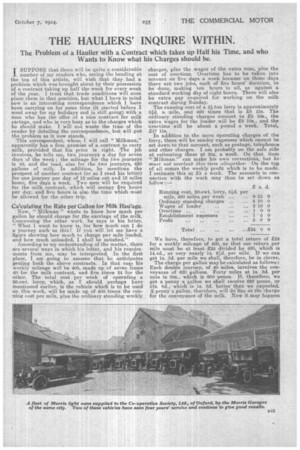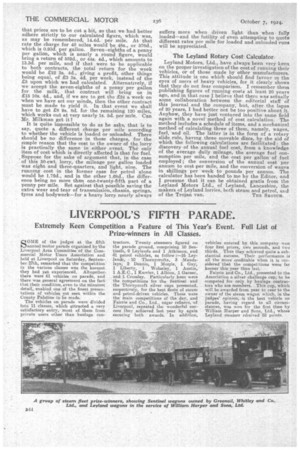THE HAULIERS' INQUIRE WITHIN.
Page 25

Page 26

If you've noticed an error in this article please click here to report it so we can fix it.
The Problem of a Haulier with a Contract which takes up Half his Time, and who Wants to Know what his Charges should be.
JSUPPOSE that there will be quite a considerable number of my readers who, seeing the heading at the top of this article, will wish that they had a problem which was brought about by their possession of a contraet taking up half the week for every week of the year. I trust that trade conditions will soon place them in that position, but what I have in mind now is an interesting correspondence which I have been carrying on for some tune (it started before I went away for my holidays and is still going) with a man who has the offer of a nice contract for milk cartage, and who is very hazy as to the charges which he should make. I will not waste the time of the reader by detailing the correspondence, but will .put the problem as it now stands.
This correspondent, whom I will call "Milkman," apparently has a firm promise of a contract to carry milk, provided that his price is right. The job involves' he tells me, two journeys a day for seven days of the week ; •the mileage for the two journeys is 40, and the load, also for the two journeys, 620 gallons of milk. In addition, he mentions the prospect of another contract (or so I read his letter) for one journey per day of 12 miles out and 12 miles home, five days a week. Two men will be required for the milk contract, which will occupy five hours per day, and five hours is also the time which must be allowed for the other trip.
Ca'culating the Rate per Gallon for Milk Haulage.
Now, " Milkman " wants to know how much per gallon he should charge for the carriage of the milk. Concerning the other work, he says in his letter, "What I want to know is, for how much can I do a journey such as this? If you will let me have a figure showing how much to charge per mile loaded, and how much unloaded, I shall be satisfied."
According to my understanding of the matter, there are several ways in which his letter, and his requirements from me, may be interpreted. In the first place, I am going to assume that he anticipates getting both the above contracts. In that case his weekly mileage will be 400, made up of seven times 40 for the milk contract, and five times 24 for the other. The total cost per week of operating a 50-cwt. lorry, which, as I should perhaps have mentioned earlier, is the vehicle which is to be used on this work, will be made up of 400 times the running cost per mile, plus the ordinary standing weekly charges, plus the wages of the extra man, plus the cost of overtime. Overtime has to be taken into account on five days a week because on those days there are two jobs, each of five hours' duration, to be done, making ten hours in all, as against a standard working day of eight hours. There will also be extra pay required for working on the milk contract during Sunday.
The running cost of a 21-ton lorry is approximately 51d. a mile, and 400 times that is 28 15s. The ordinary standing charges amount to 25 10s., the extra wages for the loader will be 12 10s., and the overtime will be about a pound a week. Total, £17 15s.
In addition to the mere operating charges of the lorry, there will be sundry expenses which cannot be set down to that account, such as postage, telephones and other charges. I am probably on the safe side at estimating these at 23s. a week. On that item " Milkman " can make his own corrections, but he must not overlook this item altogether. On the top of all comes the weekly profit which is to be made. I estimate this at R3 a week. The accounts in connection with the work may thus be set down as follow :—
We have, therefore, to get a total return of 221 for a weekly mileage of 400, so that our return per mile must be at least 224 divided by 400, which is 14.4d., or very nearly is. 2:Id. per mile. If we can get is. 3d. per mile we shall, therefore, be in clover. The charge per gallon may be calculated as follows: Each double journey, of 40 miles, involves the conveyance of 620 gallons, Forty miles at Is. 3d. per mile is 50s., which is 600 pence. If, therefore, we get a penny a gallon we shall receive 620 pence, or 5/s. 8d., which is is. 8d. better than we expected. A penny a gallon, therefore, will do fineas the charge for the conveyance of the milk. Now it may happen that prices are to be cut a bit, so that we had better adhere strictly to our calculated figure, which was, as may be remembered, 14,4d. per mile. At that rate the charge for 40 miles would be 48s., or 676d., which is 0.93d. per gallon. Seven-eighths of a penny per gallon, which is nearly a round figure, would bring a return of 532d., or 445. 4d., which amounts to 13.3d. per mile, and if that were to be applicable to both contracts, the total return for the week would be 222 3s. 4d., giving a profit, other things being equal, of .23 3s. 4d. per week, instead of the 25 upon which we had calculated. Alternatively, if we accept the seven-eighths of a penny per gallon for the milk, that contract will bring us in 215 10s. 4d., and, if we are to get the 224 a week on when we have set our minds, then the other contract must be made to yield it. In that event we shall have to get 28 9s. 8d. for the remaining 120 miles, which works out at very nearly 1s. 5d. per mile. Can Mr. Milkman get it?
It is quite impossible to do as he asks, that is to say, quote a different charge per mile according to whether the vehicle is loaded or unloaded. There should be no difference in those charges, for the simple reason that the cost to the owner of the lorry is practically the same in either event. The only item of cost which is directly affected is that for fuel. s Suppose for the sake of argument that, in the case of this 50-cwt. lorry, the mileage per gallon loaded was eight and three-quarters, and light, nine. The running cost in the former case for petrol alone would be 1.72d., and in the other 1.68d., the difference being no more than one-twenty-fifth part of a penny per mile. Set against that possible saving the extra wear and tear of transmission, chassis, springs, tyres and bodywork—for a heavy lorry nearly always
suffers more when driven light than when fully loaded—and the futility of even attempting to quote different rates per mile for loaded and unloaded runs will be appreciated.
The Leyland Rotary Cost Calculator.
Leyland Motors, Ltd., have always been very keen on the proper investigation of the cost of running their vehicles, or of those made by other manufacturers. This attitude is one which should find favour in the eyes of users of heavy vehicles, for it clearly shows that they do not fear comparison. I remember them publishing figures of running costs at least 20 years ago, and in that case I believe that there was actually some collaboration between the editorial staff of this journal and the company; but, after the lapse of N years, I had better not be too positive about it. Anyhow, they have just ventured into the same field again with a novel method of cost calculation. The method includes a schedule of items, and a mechanical method of calculating three of them, namely, wages, fuel, and oil. The latter is in the form of a rotary slide rule, having three movable discs, by the aid of which the following calculations are facilitated : the discovery of the annual fuel cost, from a knowledge of the average daily mileage, the average fuel consumption per mile, and the cost per gallon of fuel employed ; the conversion of the annual cost per annum to cost per mile, and the conversion of wages in shillings per week to pounds per annum. The calculator has been handed to lie by the Editor, and I presume that it can be obtained gratis from the Leyland Motors Ltd., of Leyland, Lancashire, the makers of Leyland lorries, both steam and petrol, and
of the Trojan van. THE SKOTCH.






























